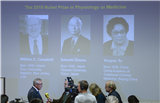Kajita, McDonald win Nobel physics prize
Updated: 2015-10-07 07:30
(China Daily)
|
||||||||
|
Takaaki Kajita, director of the University of Tokyo's Institute for Cosmic Ray Research, gestures during a news conference in Tokyo October 6, 2015. Kajita and Canadian scientist Arthur McDonald won the 2015 Nobel Prize for Physics on Tuesday for discovering that elusive subatomic particles called neutrinos have mass, opening a new window onto the fundamental nature of the universe. [Photo/Agencies] |
Takaaki Kajita of Japan and Arthur McDonald of Canada won the Nobel Prize in physics on Tuesday for discovering the "chameleon-like" nature of neutrinos, work that yielded the crucial insight that the tiny particles have mass.
The Royal Swedish Academy of Sciences said the two researchers had made key contributions to experiments showing that neutrinos change identities as they whiz through the universe at nearly the speed of light.
Neutrinos are miniscule particles created in nuclear reactions, such as in the sun and the stars, or in nuclear power plants. There are three kinds of neutrinos and the laureates showed they oscillate from one kind to another, dispelling the long-held notion that they were massless.
"The discovery has changed our understanding of the innermost workings of matter and can prove crucial to our view of the universe," the academy said.
Kajita, 56, is director of the Institute for Cosmic Ray Research and professor at the University of Tokyo. McDonald, 72, is a professor emeritus at Queen's University in Kingston, Canada.
The winners will split the 8 million Swedish kronor (about $960,000) prize money. Each winner also gets a diploma and a gold medal at the prize ceremony on Dec 10.
Kajita and McDonald made their discoveries while working at the Super-Kamiokande detector in Japan and Sudbury Neutrino Observatory in Canada, respectively.
Kajita showed in 1998 that neutrinos captured at the detector underwent a metamorphosis in the atmosphere, the academy said. Three years later McDonald found that neutrinos coming from the sun also switched identities.
- Russian warplanes hit IS targets in Syria
- Senior US envoy to visit Japan, S Korea, China
- Russia, US agree to cooperate in solving Syria crisis: Russian FM
- Iranian President calls Iran deal victory over war
- LatAm experts praise Xi on yuan, globalization
- Evidence found of summertime water flows on Mars: study

 China wins first Nobel in medicine
China wins first Nobel in medicine-
 Gary Locke: Candor key to relations
Gary Locke: Candor key to relations -
 Saving Chinese folk songs
Saving Chinese folk songs 
 Candlelight vigil for Oregon shooting victims
Candlelight vigil for Oregon shooting victims
 Chinese people's pursuits in different eras
Chinese people's pursuits in different eras
 Ten highlights from Xi's trip to US and UN
Ten highlights from Xi's trip to US and UN
 Top 10 life-changing benefits from Xi's US visit
Top 10 life-changing benefits from Xi's US visit-
 Highlights of President Xi's speeches at UN
Highlights of President Xi's speeches at UN
Most Viewed
Editor's Picks

|

|

|

|

|

|
Today's Top News
Tu first Chinese to win Nobel Prize in Medicine
Huntsman says Sino-US relationship needs common goals
Xi pledges $2 billion to help developing countries
Young people from US look forward to Xi's state visit: Survey
US to accept more refugees than planned
Li calls on State-owned firms to tap more global markets
Apple's iOS App Store suffers first major attack
Japan enacts new security laws to overturn postwar pacifism
US Weekly

|

|







